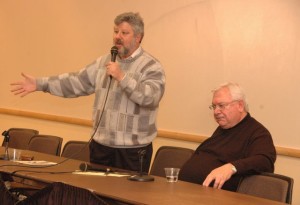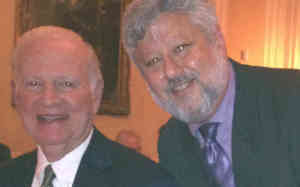One can exhaust the resources of the thesaurus trying to come up words to describe Dr. Gershon Baskin — determined, stubborn, resolute, resilient, indefatigable.
Not to mention very, very optimistic.
All such attributes are key assets to anyone interested in promoting peace, especially peace between Israelis and Palestinians, arguably the world’s thorniest and most intractable conflict.
If any individual is a match for that conflict, it’s Baskin. He is one very determined peace promoter, but not of the simplistic variety. Catchy slogans like “give peace a chance” and bumper sticker platitudes like “visualize world peace” are not his cup of tea.
Instead, he pushes peace with a plan, using hard logic and strategic thinking to counter those who insist that war and conflict are unavoidable. He doesn’t buy into fatalistic hawkish thinking any more than he does hippy-dippy sentimentality.
Baskin has been operating from that premise for decades. Originally influenced by legendary American peace activists Sen. Eugene McCarthy and Cong. Allard Lowenstein, he made aliyah at the age of 22 and has focused exclusively on the Israeli-Palestinian conflict ever since.
His resume in peace advocacy is lengthy and detailed, including a stint as Israel’s first civil servant responsible for improving Israeli-Palestinian relations.
After the first intifada, he founded the Israel-Palestine Center for Research and Information, a leading liberal think tank which he has co-directed for the past 21 years.
During an interview earlier this month in Denver, where he stopped on a nationwide tour, Baskin methodically — in a quiet but firm voice — explained why peace in the Middle East indeed does have a chance.
On why the present day — with Israelis and Palestinians both angry at the Obama administration, with PA President Abbas threatening to resign, with Hamas holding the Gaza Strip and Hezbollah in de facto control of Lebanon, with Iran inching ever closer to nuclear capability — is not the worst possible time to seek Israeli-Palestinian peace.
“All of what you said is true. These are objective realities on the ground — obstacles to peace. With all of that, I make the following claim: We have never been closer to peace because the solution for peace has never had more of a global consensus.
“There is agreement between the Israeli and Palestinian people. A majority of Israelis and a majority of Palestinians know what the price of peace is and in principle are willing to pay that price.
“We have perhaps for the first time ever an American administration [for which] the resolution of the Israeli-Palestinian conflict is a top national strategic interest. The old line of every previous administration has been that the parties have to want it more than we do, which essentially means that the parties — the Israelis and the Palestinians — have a right of veto on peace.
“We might be in a new era, in which the international community, led by the US, is saying that the Israelis and Palestinians no longer have the right of veto. The security and stability of the region and the world is too important to allow these feuding tribes to risk a war that the world doesn’t want to fight.”
On the practical steps that can lead to peace:
“There’s no mystery. The parameters of peace are known. A two-state for two people solution. A city of Jerusalem which will be the capitals of both countries. Jerusalem is a very sacred city and you cannot divide it. The crucial question in Jerusalem is a question of security, not of politics.
“The Palestinians talk about the refugee issue all the time. Off the record, all the Palestinian leaders say, ‘We know that they’re not going home.’ They know that there is a fundamental contradiction between a right of return and a two-state solution. And the Palestinians want their independent state, self-determination.
“The refugees are going to have to make a transformation in their minds, that the right of return to their home is going to be the right of return to their homeland.
“Hopefully, a lot of the settlements that Israel will eventually have to vacate will be turned over into refugee property and Israel will participate in an international fund to pay compensation for refugees who lost real property. The settlement properties that have been left behind will be part of that payment.
“Israel will also have to verbally acknowledge, in a sincere way, its part of the responsibility for creating the refugee problem, just as I would demand of the Palestinians that they make a acknowledgement of the horrific things that they have done to Jews and Israelis over the years. This is part of the reconciliation process.
“These are pieces of the puzzle that will have to be put together. Our [Israeli] leaders have lied to our public for 42 years that Jerusalem is a united city. Their leaders have lied to the Palestinians for 62 years that they’re going back to their homes.
“The tradeoff is that they give up the right of return and we give up our claim of sovereignty over the Temple Mount, which is easier for us to do than for them, because according to our own Jewish laws, we’re not supposed to go up there.
“We keep the Western Wall, and both parties agree that they won’t dig, excavate, tunnel, build or destroy in any way this holy compound without mutual agreement. That’s the recipe.”
On the difficulties posed by the fact that Palestinian territories are divided between the Palestinian Authority in the West Bank and Hamas in Gaza:
“The PA has full control of the West Bank. According to the road map obligations, they have dismantled the infrastructure of Hamas in the West Bank, they’ve closed down their charities, closed down their schools, arrested their operatives, fired Hamas mayors. There are more than 300 Hamas operatives in PA jails now. They have fired the Hamas-loyal clergy. They’re in total control.“This is opposed to the image that’s been painted in Israel and the West, that Mahmoud Abbas is a weak leader. He has proven that he’s a strong leader, that he’s courageous and that he’s a partner for peace.
“Fortunately . . . there is a sharp decline in support for Hamas in the West Bank and in Gaza.
“Our goal has to be to create the mechanisms to reduce Hamas to its real size. Hamas’s real size, in terms of Palestinian public opinion, on what Hamas stands for, is about 15%. Hamas won the elections for lots of reasons. We — meaning us, the PA, Egypt, the international community — have to continue to weaken Hamas. We can speed up this process.
“In addition, we need to make a peace agreement with the PA that says that this will apply to Gaza when the regime in Gaza changes. We have to begin to construct a physical link between the West Bank and Gaza.
“Gaza will be part of it when Gaza becomes part of it. Build the bridge, the tunnel, whatever it is, a mile short of Gaza and prevent Hamas from digging the tunnel the rest of the way. It will create a real vision for the people in Gaza that their reality can be very different. It’s their choice.”
On whether it’s realistic to believe that peace can be imposed on Israelis and Palestinians by foreign nations:
“A majority of Israelis and Palestinians are willing in principle to pay the price of peace, but don’t think there’s a partner for peace. Both sides have breached agreements, both sides have used violence against the other side. There’s no reason why they should trust each other.
“The only way this will work is with an externally imposed peace.
“This process was built initially on us transferring the responsibility for security to the PA. The PA abused that privilege and responsibility and ended up attacking us with guns that we provided for them. That’s no longer a workable mechanism.
“There is zero chance of these parties reaching a bilateral negotiated agreement. Under much better circumstances it was impossible. Today with a right-wing, religious-led Israeli government and a divided Palestinian polity, they can’t reach agreement.
“There has to be an external agreement on the table that is the point of reference, backed by the Quartet, with the willingness of the international community, led by the US, to provide the guarantees — financial but more important than that, security guarantees.
(Security, in Baskin’s view, will probably have to include international armed peacekeepers, but not from the US or the UN — “because the Israelis don’t trust the UN anymore.”)
On the wisdom of Obama making Israeli settlements the central issue in furthering the peace process:
“I don’t have a lot of faith in Obama, I have a lot of hope — with a lot of question marks, because so far in my estimation what they’ve done on this issue has been bad.
“It’s a deep mistake to use settlements as the key issue in moving the peace process forward. The settlers have no reason to cooperate with the US or Obama. They don’t even cooperate with Netanyahu. Settlers have manipulated one Israeli government after another. They’re not going to acquiesce now because Bibi or Obama asked them to.
“And if you do get a settlement freeze, nothing changes on the ground. It was a mistake of the Palestinians to demand something which was silly.
“The strategic issue is the border, not a settlement freeze. The border determines the future of settlements.”
On the role of Iran in preventing serious progress in Israeli-Palestinian peace efforts:
“It’s very potent and the way of addressing that is by restarting the Israeli-Syrian negotiations. There are people in the Israeli security and military establishment who would much prefer us negotiating with the Syrians than with the Palestinians because the strategic benefits to Israel are so much clearer and so much more important.
“Giving back the Golan under security arrangements that were approved in the Clinton days provides Israel with the security guarantees that it needs on the Golan Heights, but we add into that the drawing of Syria away from Iran.
“While Syria will not cut its relations with Iran, it understands that a precondition for getting the Golan Heights will be to stop the flow of weapons and money to Hamas and Hezbollah.”
On whether the “post-Zionist” idea of a one-state solution to the Israeli-Palestinian conflict is gaining any traction among liberal Jews:
“These people don’t know what they’re talking about. It draws us back into an existential conflict. It turns the Israeli-Palestinian conflict from a dispute over assets and territory into a dispute over identity.“I would compare it to Bosnia. Bosnia was a war over identity and in four years 150,000 people were killed. The stakes are much higher when it’s over identity.
“I say this to my Palestinian friends who support what I call the one-state option, not a solution: ‘I don’t know who gave you the right to deny Palestinians self-determination.’
“Palestinians must go through a period of statehood. They have to take responsibility for themselves. They have to become an equal member of the family of nations. If they don’t, they will be a burden to the international community forever.”
On the current state of Israel-US relations and how it is likely to impact the peace process:
“There’s a sense that Obama’s definition of friendship between the US and Israel goes beyond sending Israel money and military equipment; that friendship is a responsible relationship and that it may require the Americans to continue to point out that Israel is on a collision course with the entire world. A friend will help that state from going in that direction.”
Interview from the Intermountain Jewish News. http://ijn.com/features/ijn-features/1341-dr-baskin-works-the-gears-of-peace



